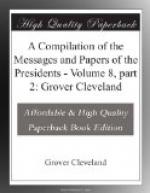There is no part of the means placed in the hands of the Executive which might be used with greater effect for unhallowed purposes than the control of the public press. The maxim which our ancestors derived from the mother country that “the freedom of the press is the great bulwark of civil and religious liberty” is one of the most precious legacies which they have left us. We have learned, too, from our own as well as the experience of other countries, that golden shackles, by whomsoever or by whatever pretense imposed, are as fatal to it as the iron bonds of despotism. The presses in the necessary employment of the Government should never be used “to clear the guilty or to varnish crime.” A decent and manly examination of the acts of the Government should be not only tolerated, but encouraged.
Upon another occasion I have given my opinion at some length upon the impropriety of Executive interference in the legislation of Congress—that the article in the Constitution making it the duty of the President to communicate information and authorizing him to recommend measures was not intended to make him the source in legislation, and, in particular, that he should never be looked to for schemes of finance. It would be very strange, indeed, that the Constitution should have strictly forbidden one branch of the Legislature from interfering in the origination of such bills and that it should be considered proper that an altogether different department of the Government should be permitted to do so. Some of our best political maxims and opinions have been drawn from our parent isle. There are others, however, which can not be introduced in our system without singular incongruity and the production of much mischief, and this I conceive to be one. No matter in which of the houses of Parliament a bill may originate nor by whom introduced—a minister or a member of the opposition—by the fiction of law, or rather of constitutional principle, the sovereign is supposed to have prepared it agreeably to his will and then submitted it to Parliament for their advice and consent. Now the very reverse is the case here, not only with regard to the principle, but the forms prescribed by the Constitution. The principle certainly assigns to the only body constituted by the Constitution (the legislative body) the power to make laws, and the forms even direct that the enactment should be ascribed to them. The Senate, in relation to revenue bills, have the right to propose amendments, and so has the Executive by the power given him to return them to the House of Representatives with his objections. It is in his power also to propose amendments in the existing revenue laws, suggested by his observations upon their defective or injurious operation. But the delicate duty of devising schemes of revenue should be left where the Constitution has placed it—with the immediate representatives of the people. For similar reasons the mode of keeping the public treasure should be prescribed by them, and the further removed it may be from the control of the Executive the more wholesome the arrangement and the more in accordance with republican principle.




